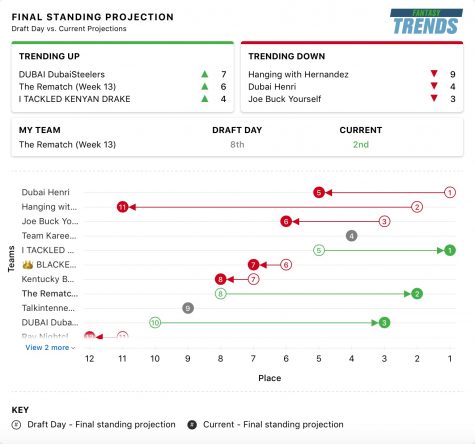Op-Ed: The Thrills of Fantasy Football
Fantasy is a unique strategic hobby that doesn’t get the recognition it deserves.
Jaffer poses with Fantasy Football Club leader Phillip Lull ’23 and club advisor Pete Slaski.
In a recent Statista research study, some of the most common hobbies in our society today include listening to music, traveling, gardening, and other activities that you might expect to see in your everyday lives. However, a hobby that I truly believe does not get the recognition and respect it deserves is fantasy football.
Fantasy football is an activity based on the National Football League (NFL) where groups of friends, coworkers, or families form a league together and “draft” real-life NFL players onto their own fantasy team. Leagues are managed by an appointed “commissioner” of the group and can be used on many sites, such as ESPN, Yahoo, and NFL Fantasy.
Each player will get a specific point value based on how well they do each week in real life, but every league can have its own special scoring rules. A fantasy league can last as many weeks as the NFL regular season lasts, with all leagues having the ability to format their own set of playoffs, which will eventually crown a league champion.
There can be different leagues, such as an auction league or a dynasty league, which stretches over multiple years. Many leagues may even have a buy-in, which occurs when all players put a predetermined amount of money into a “pot,” which gets distributed among the top two or three players at the end of the season.
A great part of fantasy football is that it doesn’t play to the advantage of a veteran player. Thanks to many statistics and predictions provided by the league site, it is very easy for a first-year player to compete in a serious league. I continue to be stunned every year when I get knocked off by a rookie, ending my season to someone I might’ve previously thought I was superior to.

An added benefit is that besides the draft, fantasy football typically doesn’t take that much time or energy. I have often been in a league where the eventual champion didn’t spend more than ten minutes a week picking out his lineup and editing his team.
However, for the people who want to spend more time on it, like me, there is so much more that you can do. Being in five leagues this year, I can attempt to upgrade my team by making trades or analyzing past player performances to predict their future ones. It truly caters to everyone, no matter the amount of time or experience that you have.
Since its introduction in 1962, fantasy football has constantly been gaining increased popularity among all people. During the 2021 season, over 40 million users have logged on so far to compete in a fantasy football league in the U.S. alone. Despite football primarily being an American sport, the influence of fantasy football has stretched all over the world. According to an August ESPN article, over 20 million people participate in fantasy football in India, with that number potential to spike to over 100 million in the coming years.
The activity has gained so much popularity because of the strong sense of connection built with other people in the league. Having a two-hour-long initial draft altogether, trash-talking on the chat board and in real life, and meeting up to crown the champion help players get to know each other.
Despite the initial fierce competition that people may perceive from fantasy football, a togetherness is formed that you can’t get from other hobbies. The rivalries and matchups are truly what bring the league closer together.
Personally, my favorite part is sitting down every Sunday and watching football with my friends and family. During Fantasy Football season, participants discuss what happens in the game, prodding each other for information and pondering potential trades.
I can say with confidence that being in a fantasy football league with my family has brought me infinitely closer to them, as it becomes a nightly topic to discuss at dinner, where we can laugh and share some of the best moments of the week with one another.
As for the future, I plan to continue playing in fantasy football leagues for as long as I can. The constant highs and lows that I experience during fantasy season are unlike any I have felt before. Some of my fondest memories had occurred because of fantasy football, like the time when my friends and I all dressed up in suits and booked a conference room to do our draft. The league can be as straightforward or as complicated as you make it. Another great part about fantasy football is choosing what happens: how much you care about it and how much you focus on it; nothing can happen without your decision.
Having played fantasy football for seven years now, I can say that choosing to play it was one of the best decisions that I’ve made. With the friendships, I’ve built and the memories I’ve made, it’s safe to assume that my life wouldn’t have been the same without the holy grail of hobbies: fantasy football.


Edan celebrated four years on The Gator's staff. In addition to editing stories, he also took photos for The Gator and was a member of the Creative Arts Diploma Program for Visual Arts. Edan finds photojournalism to be a fun method of artistic storytelling.





















































